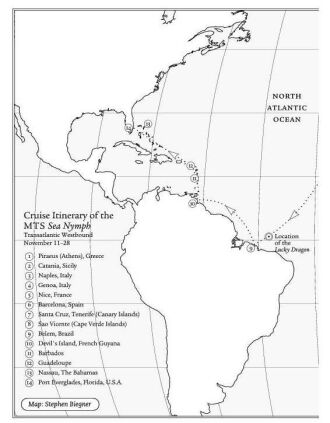Dreamboat
Authors: Judith Gould


This is a work of fiction. Names, characters, places, and incidents are either the product of the author's imagination or are used fictitiously, and any resemblance to actual persons, living or dead, business establishments, events or locales is entirely coincidental.
Â
Dreamboat
Â
A
New American Library
Book / published by arrangement with the author
Â
All rights reserved.
Copyright ©
2005
by
Judith Gould
This book may not be reproduced in whole or part, by mimeograph or any other means, without permission. Making or distributing electronic copies of this book constitutes copyright infringement and could subject the infringer to criminal and civil liability.
For information address:
The Berkley Publishing Group, a division of Penguin Putnam Inc.,
375 Hudson Street, New York, New York 10014.
Â
The Penguin Putnam Inc. World Wide Web site address is
http://www.penguinputnam.com
Â
ISBN:
978-1-1012-1993-5
Â
A
NEW AMERICAN LIBRARY
BOOK®
New American Library
Books first published by The New American Library Publishing Group, a member of Penguin Putnam Inc.,
375 Hudson Street, New York, New York 10014.
NEW AMERICAN LIBRARY
and the “
NAL
” design are trademarks belonging to Penguin Putnam Inc.
Â
Electronic edition: September, 2005
N
OVELS BY
J
UDITH
G
OULD
Sins
Love-Makers
Dazzle
Never Too Rich
Texas Born
Forever
Too Damn Rich
Second Love
Till the End of Time
Rhapsody
Time to Say Good-Bye
A Moment in Time
The Best is Yet to Come
The Greek Villa
The Parisian Affair
This novel is dedicated to Christine Flouton, whose help, encouragement, loyalty, generosity of spirit, and sense of humor have gotten me through some rough patches with a smile.
Â
Now is the season of sailing; for already the chattering swallow is come and the pleasant west wind; the meadows flower, and the sea tossed up with waves and rough blasts has sunk to silence. Weigh thine anchors and unloose thy hawsers, O mariner, and sail with all thy canvas set . . .
âLeonidas of Tarentum, fl. 274
B
.
C
.
Greek Mythology,
J.W. Mackail, ed. (1906), sec. 6, no. 26
Journeys end in lovers meeting,
Every wise man's son doth know.
âWilliam Shakespeare,
Twelfth-Night,
II, iii, 46



G
eorgios Vilos sat behind the large mahogany George II desk in the office on the top floor of his Eaton Place mansion in London's fashionable Belgravia. Outside, the trees had shed all but a few of their leaves, dry, brown stragglers that held on to denuded branches, rattling in the wind. The chill drizzle of a late autumn rain beat a steady tattoo against the mansion's windowpanes. Within the sumptuous confines of his home office, Georgios Vilos was oblivious to the inclement English weather. While the lower floors of his vast mansionâone of the few in the neighborhood not yet broken up into smaller apartmentsâwere abuzz with the endless activity required to maintain the residence in its opulent state, his office was a sanctuary. There, Georgios Vilos often withdrew to contemplate the future of his empire, to plan and strategize, and sometimes to do as he was doing today: study the latest figures given to him by his accounting division.
The report from Adonis Papadrakis, his CFO, confirmed what he already knew to be true. Vilos Shipping, Ltd., the small company he had inherited from his father and expanded into an international empire worth billions of dollars, was sinking, like a torpedoed ship, under a load of staggering debt. Now, two of his chief rivals, Panos Simitis and Spiros Farmakis, who like himself were Greeks of middling origin who had built enormous empires, were making inroads on the Vilos empire.
Georgios Vilos closed the file, which was stamped
CONFIDENTIAL
in bloodred letters on its cover, and sat back in his mahogany and gilt Thomas Hope-designed chair. He ran his thick fingers through his silver hair, exhaled a sigh, and took off his gold-rimmed eyeglasses, placing them
atop the report. His heavy-lidded eyes, often remarked on as mischievous and full of merriment, or, alternately, calculating and intense, came to rest on one of the two silver-framed photographs that decorated his desk. Fiona, his elegant British-Greek wife, stared out at him from one of them. Her strawberry-blond hair was swept back into a loose chignon, a few errant wisps of hair carefully arranged to better frame her beautiful face with its high, prominent cheekbones, mesmerizing blue eyes, and long, narrow nose. Her skin, so perfect as to be almost translucent, was as radiant as it was flawless. On her ears were diamond earrings, with nine-carat D-color pendants dangling from clusters of seven smaller stones. A matching choker encircled her long swan neck. The jewelry had been made by the legendary old Russian firm Alexandre Reza, located in Paris since after the revolution, and Georgios vividly remembered the day he had successfully bid on them at Sotheby's in Geneva. When the hammer fell and the diamonds were his, Fiona had turned to him in the salesroom and, in front of the roomful of assembled bidders, kissed and hugged him excitedly.
Georgios emitted another sigh, his gaze still fixed on the photograph. It had been taken several years after the auction, and the smile on Fiona's lips was forced. Their marriage at that point had become a battleground upon which they waged perpetual war against each other. It had begun with his liaisons with other women, trifling flings of no consequence as far as he was concerned. But Fiona didn't see his behavior in that light, and had reacted in kind, taking a series of lovers whom she flaunted in the most disgraceful manner. They had eventually come to a kind of truce and remained married, but in name only. The wounds they had inflicted on each other in the past had never quite healed, and though they occupied the same sumptuous homes and sometimes went out together, traveled together, and entertained as a couple, they lived separate lives. Fiona was civil, as was he, but he knew that it was only the money that held them together. He also knew that Fiona wouldn't hesitate to leave him in search of greener pastures if his empire crumbled.
He abruptly pushed his chair back and rose to his feet, walking over to one of the windows, where he looked out at the dreary London day. His tall, big-boned frame practically filled the window.
It's the Germans,
he thought angrily.
Those goddamned German bankers
. He loathed them. No matter how much of their money they loaned him to build new ships, he would never feel comfortable with them. Now the money was spent,
the loans were soon due, and the banks were not willing to change the original terms of the deal. There would be no extensions, no reprieves, no negotiations, no further credit extended. Vilos Shipping, Ltd. would have to give the banks the two hundred and fifty million dollars they were due or his ships would be impounded. It was as simple as that.
My beautiful ships,
he thought sadly.
The most beautiful ships afloat. And the reason for all of my problems
. At a time when other cruise lines were building bigger and bigger vessels carrying three thousand passengers plus another two thousand in crew, Georgios Vilos had chosen to go in the opposite direction. Deciding to add to his aging fleet, he had built two small, elegant ships that carried a mere eight hundred passengers in pampered luxury. These ships weren't merely small and luxurious, however; they were also the fastest ships ever built, capable of maintaining a speed of twenty-eight knots for long periods of time, even on trans-Atlantic voyages. The
Queen Elizabeth II
could go that fast, but the ship would shudder to pieces if it tried to maintain such a speed. His ships could cross the Atlantic and make the trek to Hawaii in two daysâa feat that took most ships five. He was proud of the
Sea Nymph
and the
Sea Sprite,
but the cost overruns had been ruinous. Materials and labor costs had skyrocketed during the long process of building the beautiful vessels. Before they were anywhere near completion, he'd had to start seeking the funds to finish them, then more funds to launch them. The pride and joy of his fleet, they had proven to be his downfall.
He had sought credit elsewhere to pay off the note, but had come up empty-handed. Virtually no one would extend him credit in his current financial predicament. In fact, more than a few financial institutions had seemed to take great pleasure in refusing the great Georgios Vilos. Like a computer virus, word of his dire straits had quickly spread. He endured more than a few cold shoulders and outright taunts, even among the large, tight-knit community of enormously rich Greek families who had their principal homes in London and conducted their financial enterprises from there.
Bastards
, he thought.
They love nothing more than to see one of their own suffer, to see one of their fellow countrymen fall from the heights of glory.
He turned from the depressing sight out the window and went to the Regency library table that served as a bar. From the large silver tray he picked up the bottle of ouzo and poured a generous portion into an antique St. Louis crystal glass. From the silver ice bucket he took several
cubes, dumped them in the glass, then swirled the drink around, watching as the ouzo became cloudy. He might have come a long way from the village he'd grown up in outside of the port of Piraeus, where his father's small business had its offices, but he felt that his heart and soul were still Greek to the core. He took a big sip of the anise-flavored drink, then went back to his desk and sat down on the Thomas Hope chair, a chair that he'd always thought suited a man of his influence, wealth, and power. He set the drink down, then drummed his manicured fingernails on the desktop for a mere instant.
Well, I won't give the sons of bitches the pleasure
, he thought, smiling tightly.
No, indeed. They've got a surprise coming to them. Georgios Vilos is not beaten yet.
He took another swallow of the ouzo and shook with a brief chuckle.
They think the old man has had it, but I'll show them what this old man can do
. He set the glass down on the desk, and his gaze fell on the other silver-framed photograph that sat next to the one of Fiona. Makelos, his only child and heir. Georgios's features suddenly took on an aspect that was a mixture of pride and puzzlement. MakelosâMark, as he had anglicized his nameâwas one of the most handsome young men he had ever seen, and that, he knew, was not simply a proud father's opinion. Makelos made heads turn walking down the street, and all eyes turned to him when he entered a room. The girls were crazy about him, and he had his pick among the international set with whom he socialized. His black hair and dark eyes, his chiseled features and hard, muscular body, and his graceful yet manly movements were riveting. He was an excellent sailor, as any man of Greek descent should be, Georgios thought, and he had done well enough on the rugby field. Now, he was a worthy adversary on the polo field and tennis courts. He was also intelligent and had done well at the expensive private schools where he'd been sent, and then had performed tolerably well at Oxford.
Georgios picked up the ouzo, swirled it around in the glass again, then took another sip, his gaze still focused on his son. MakelosâMark! Would he ever become accustomed to the name?âwas also, he knew, spoiled and arrogant. He was used to getting his way, and God help anyone who tried to stop him. There had been a problem or two with the girls over the yearsânothing serious, he thoughtâand Georgios attributed them to his son's inborn, high-octane testosterone, nothing more. Perhaps time would temper his interest in women and the endless round of parties that seemed
to occupy the young man. For a long time Georgios hadn't worried about his son's perpetual dalliances, remembering his own wild youth. But there had come a time, he reminded himself, when that stage of his life had simmered down as his work had taken over, then consuming him, as he built Vilos Shipping, Ltd. into the international company that it had become. It was time that Makelos did something useful to help the company. His son owed him, he thought, and it was time he paid his debt.
His gaze swept around the magnificent office in which he sat, taking in its mahogany-paneled walls, the immense fireplace with its Adam mantel, the perfectly faded silk Tabriz on the floor, the antiques that glowed with rich patinas, and the Impressionist paintings that graced the walls. There were even a few Greek antiquities of impeccable provenance. No power on earth would force him to give all this up.
With that thought, he picked up the telephone and dialed his personal assistant. She picked up on the second ring. “Georgios Vilos's line,” she said in her clipped British voice.
“Rosemary,” he said, “check to see when my appointment is with the bankers in Athens.”
“The appointment is at four p.m. on Thursday. That's Athens time, Mr. Vilos,” she retorted. “They called to confirm this morning.”
“Good,” he replied. “Call the pilot to get ready for takeoff and tell Mrs. Vilos that we'll be flying to Athens today.”
“Yes, sir,” Rosemary said. “Will I be going with you, sir?”
“Yes.”
“Are there any files that I should bring with me?” she asked.
“I think I have all the files we need here,” he answered.
“I'll make the calls and get ready right away, sir,” she said.
“Good-bye,” Vilos said, hanging up the receiver without waiting for a reply. He sat staring at the telephone, lost in thought. He found the idea of this meeting with the Lampaki brothers repugnant, but he had no other options left. There was a chance they would give him a loan to meet his obligations with the German banks, but they would charge an astronomically usurious interest rate. Simply repaying them would require a vast and potentially crippling cutback in day-to-day operations, above and beyond the trimming he'd already done. If it saved his empire, however, the costs, no matter how high, would be worth it. Should the Lampakis turn him down, he would have to use a backup plan, one that eliminated dealing with the banks altogether.
He picked up one of his cell phonesâthe one with his most private numberâand dialed the number he'd memorized months before. He waited impatiently through three rings. On the fourth ring, his call was answered.
“Yes?”
“Can you talk?” Georgios Vilos asked.
“For a moment.”
“Is the package I ordered ready?”
“Yes.”
“Very good.”
“When and where do you want it delivered?”
“At my office in Piraeus, Greece, on the date we discussed.”
“What time?”
“Noon.”
“The second payment must be in my account the day before.”
“That's not a problem, I assure you,” Vilos replied.
“Then I will see you in Piraeus.”
“You mustâ” Georgios Vilos began, but there was no one on the line. Azad had hung up.
He flipped the cell phone shut, sat back in his chair, and took a deep breath. He disliked dealing with this revolting man even more than dealing with the Lampaki brothers, but as with them, he had no choice. The munitions dealer was by necessity secretiveâand exorbitantly expensiveâbut he was also needlessly arrogant, Vilos thought. It was as if he could see the smirk on the man's face the few times he'd spoken to him by phone. He could hear the condescension in his voice, as if he thought he was dealing with a helpless juvenile.